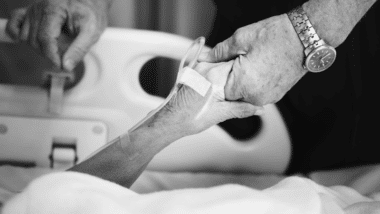People who contemplate suicide due to serious illness need mental health care, not help to kill themselves, two palliative medicine experts have said.
Data from the Office for National Statistics (ONS) showing higher suicide rates among the chronically ill had been seized upon by pro-assisted suicide activists to claim it supported their demands for fewer legal protections for vulnerable people.
But Professor of Palliative Medicine at Cardiff University Baroness Finlay of Llandaff and the Laing Galazka Chair in Palliative Care at King’s College London, Professor Katherine Sleeman, said the figures showed the need for greater mental health support.
ONS analysis
The ONS found a higher rate of suicide among patients diagnosed with some chronic heart and lung conditions, and cancer with low survival rates.
Of the 17,195 people who died due to suicide from 1 January 2017 to 31 March 2020, people with the selected diseases were statistically twice as likely to commit suicide when compared with matched controls.
The ONS claimed: “In many instances, people diagnosed with these conditions would meet the definition of having a terminal illness.”
Legal requirement
Dignity in Dying, formerly the Voluntary Euthanasia Society, claimed the data supported its campaign to allow terminally ill people who are mentally distressed “the safe, legal choice” of assisted suicide.
But Lady Finlay told Channel 4 News: “The law has only just been changed to make sure that specialist palliative care must be available to people who need it. That hadn’t been the case up until now, and that’s going through Parliament.
“So, specialist palliative care must be available, people must not be left without the care that they need, without the support they need”.
She added that “those with mental health issues certainly also need the support from mental health services, and that’s what the law currently says.”
Limitations
In a letter to The Times newspaper, Professor Katherine Sleeman and colleague Joanna Davies highlighted an “important potential limitation” of the ONS analysis, in that it did not “take account of diagnosis of serious mental illness, including depression”.
They said: “It is entirely plausible that the higher rate of suicide among people with severe health conditions is due to more mental illness in this group.
“We caution against concluding that the data supports the case for legalisation of assisted dying. What is needed is better mental health support for people who have had severe health conditions diagnosed.”
Cheap solutions
Gordon Macdonald, CEO of the Care Not Killing coalition, welcomed the release of the figures “which no doubt advocates of assisted suicide and euthanasia will claim support their calls for a change in the law – but they do not.”
Rather, he continued, they “suggest that much more work needs to be done to support dying and vulnerable people by providing them with universal access to treatment for both their physical and psychological needs.
“This means extending high quality palliative care to all those who need it, not reaching for a cheap short-term solution of facilitating a rise in people committing suicide or having their lives ended by the state.”
Defeated again
Last month, as many as 35 psychiatrists signed a letter to express concern about Lord Forsyth’s recent attempt to legalise assisted suicide in England and Wales.
The letter, published in The Daily Telegraph, stated: “Such legislation cuts a policy hole in suicide prevention, by measuring who should be helped to end their lives against an arbitrary set of criteria.”
It concluded: “The argument for physician-assisted suicide is being championed by people who are educated and articulate: the dangers affect those least able to speak up for themselves. To protect these vulnerable and voiceless people, we need to maintain the law as it stands.”
In March, Lord Forsyth’s amendment to the Health and Care Bill was defeated by 179 votes to 145. It was the twelfth time since 1997 that proposals for assisted suicide-related laws have not been passed by UK parliamentarians.

Doctors: ‘Public being scared into supporting assisted suicide’
Assisted suicide gives ‘unaccountable power’ over the vulnerable, Bishop warns

